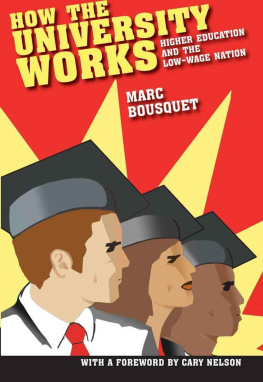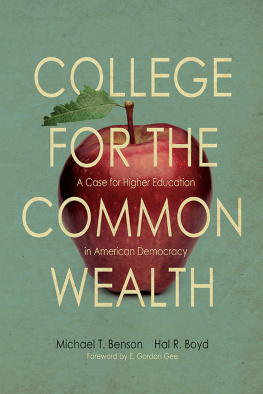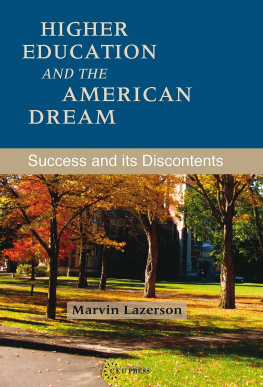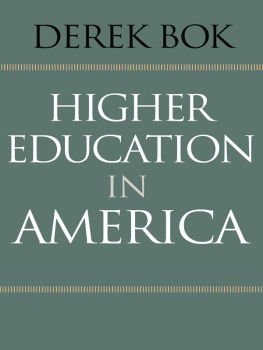Cary Nelson - How the University Works: Higher Education and the Low-Wage Nation
Here you can read online Cary Nelson - How the University Works: Higher Education and the Low-Wage Nation full text of the book (entire story) in english for free. Download pdf and epub, get meaning, cover and reviews about this ebook. City: New York, NY, United States, year: 2010, publisher: New York Univ. Press, genre: Politics. Description of the work, (preface) as well as reviews are available. Best literature library LitArk.com created for fans of good reading and offers a wide selection of genres:
Romance novel
Science fiction
Adventure
Detective
Science
History
Home and family
Prose
Art
Politics
Computer
Non-fiction
Religion
Business
Children
Humor
Choose a favorite category and find really read worthwhile books. Enjoy immersion in the world of imagination, feel the emotions of the characters or learn something new for yourself, make an fascinating discovery.
- Book:How the University Works: Higher Education and the Low-Wage Nation
- Author:
- Publisher:New York Univ. Press
- Genre:
- Year:2010
- City:New York, NY, United States
- Rating:5 / 5
- Favourites:Add to favourites
- Your mark:
- 100
- 1
- 2
- 3
- 4
- 5
How the University Works: Higher Education and the Low-Wage Nation: summary, description and annotation
We offer to read an annotation, description, summary or preface (depends on what the author of the book "How the University Works: Higher Education and the Low-Wage Nation" wrote himself). If you haven't found the necessary information about the book — write in the comments, we will try to find it.
Cary Nelson: author's other books
Who wrote How the University Works: Higher Education and the Low-Wage Nation? Find out the surname, the name of the author of the book and a list of all author's works by series.
How the University Works: Higher Education and the Low-Wage Nation — read online for free the complete book (whole text) full work
Below is the text of the book, divided by pages. System saving the place of the last page read, allows you to conveniently read the book "How the University Works: Higher Education and the Low-Wage Nation" online for free, without having to search again every time where you left off. Put a bookmark, and you can go to the page where you finished reading at any time.
Font size:
Interval:
Bookmark:
How the University Works
C ULTURAL F RONT
General Editor: Michael Brub
Manifesto of a Tenured Radical
Cary Nelson
Bad Subjects: Political Education for Everyday Life
Edited by the Bad Subjects Production Team
Claiming Disability: Knowledge and Identity
Simi Linton
The Employment of English: Theory, Jobs, and the
Future of Literary Studies
Michael Brub
Feeling Global: Internationalism in Distress
Bruce Robbins
Doing Time: Feminist Theory and Postmodern Culture
Rita Felski
Modernism, Inc.: Body, Memory, Capital
Edited by Jani Scandura and Michael Thurston
Bending Over Backwards: Disability, Dismodernism, and
Other Difficult Positions
Lennard J. Davis
After Whiteness: Unmaking an American Majority
Mike Hill
Critics at Work: Interviews 19932003
Edited by Jeffrey J. Williams
Crip Theory: Cultural Signs of Queerness and Disability
Robert McRuer
How the University Works: Higher Education and the
Low-Wage Nation
Marc Bousquet; Foreword by Cary Nelson
Higher Education and the
Low-Wage Nation
Marc Bousquet
Foreword by Cary Nelson

NEW YORK UNIVERSITY PRESS
New York and London
www.nyupress.org
2008 by New York University
All rights reserved
Library of Congress Cataloging-in-Publication Data
Bousquet, Marc
How the university works : higher education and the low-wage
nation / Marc Bousquet; foreword by Cary Nelson.
p. cm.
Includes bibliographical references and index.
ISBN-13: 978-0-8147-9974-1 (cloth : alk. paper)
ISBN-10: 0-8147-9974-4 (cloth : alk. paper)
ISBN-13: 978-0-8147-9975-8 (pbk. : alk. paper)
ISBN-10: 0-8147-9975-2 (pbk. : alk. paper)
1. College teachersSalaries, etc.United States. 2. Universities
and collegesEmployeesSalaries, etc.United States. I. Title.
LB2334.B58 2007
331.28137812dc22 2007029790
New York University Press books are printed on acid-free paper,
and their binding materials are chosen for strength and durability.
Manufactured in the United States of America
c 10 9 8 7 6 5 4 3 2 1
p 10 9 8 7 6 5 4 3 2 1
To Heather
For an Organization of Intellectual Workers
I consider it important, indeed urgently necessary, for intellectual workers to get together, both to protect their own economic status and also, generally speaking, to secure their influence in the political field.
On the first-mentioned, the economic side, the working class may serve us as a model: they have succeeded, at least to some extent, in protecting their economic interests. We can learn from them too how this problem can be solved by the method of organization. And also, we can learn from them what is our gravest danger, which we ourselves must seek to avoid: the weakening through inner dissensions, which, when things reach that point, make cooperation difficult and result in quarrels between the constituent groups.
The intellectual worker, due to his lack of organization, is less well protected against arbitrariness and exploitation than a member of any other calling.
An organization of intellectual workers can have the greatest significance for society as a whole by influencing public opinion through publicity and education. Indeed it is its proper task to defend academic freedom, without which a healthy development of democracy is impossible. An outstandingly important task for an organization of intellectual workers at the present moment is to fight for the establishment of a supranational political force as a protection against fresh wars of aggression.
Albert Einstein, 1949
Appendix A: Yeshiva University 444 US 672,
Justice Brennan, Dissenting
Appendix B: Brown University 1-RC-21368,
Liebman and Walsh, Dissenting
This book could not have appeared without the unflagging support and encouragement of a long list of activist intellectuals, especially those who comprise the editorial collective of Workplace: A Journal for Academic Labor ( www.workplace-gsc.com ). These include, among many others, Dick Ohmann, Paul Lauter, Gary Rhoades, Bill Vaughn, Katherine Wills, Eileen Schell, Bruce Simon, Christian Gregory, Steve Parks, Laura Sullivan, Karen Thompson, Cary Nelson, Michael Brub, Vicky Smallman, Randy Martin, Steve Watt, Matt Gold, Tony OBrien, Gregory Bezkorovainy, Ali Zaidi, Susan OMalley, Vinny Tirelli, Greg Meyerson, Julie Schmid, Kirsten Christensen, Felicia Carr, Ray Watkins, Noreen OConnor, Barbara Foley, Jamie Owen Daniel, Rich Daniels, Bill Hendricks, Don Lazere, Joe Aimone, Mary Refling, and Kent Puckett. Some of the collective, like Aimone, are responsible for drafting me into the movement; others, like Refling, Daniel, and Smallman, for keeping the movement going; still others, like Nelson, Lauter, and Martin, for continuing to provide intellectual leadership and generous support at critical junctures in the journey. All of them have contributed in some very significant way to this project, in ways simply too various to catalog.
Of foundational importance was my experience at the City University of New York, where I first began to understand the prospects for greater equality and democracy represented by public higher education. Among my CUNY comrades I especially have to thank Eric Marshall of the Adjunct Project and Leo Parascondola, Barbara Bowen, Stanley Aronowitz, and George Otte, who first suggested I attend a union meeting. At CUNY and thereafter, my friend Granville Ganters contributions to this project ran the gamut from critic and copyeditor to matchmaker and mixologist.
I doubt that I would have written this book without the years I spent as an assistant and then tenured associate professor at the University of Louisville, in a right-to-work state with a powerless faculty, and where public university coaches and presidents cart their compensation home in wheelbarrows while spectacularly failing to serve student need. While in Louisville, I was especially grateful for the friendship of fellow transients Susan Erdmann, Stephen Dougherty, Wayne Ross, and Sandra Mathison and for the indispensable intellectual partnership of a courageous network of activist graduate students, especially Chris Carter (now at the University of Oklahoma), Tony Scott, (University of North CarolinaCharlotte), Laura Bartlett (University of OhioMarion), and Steve Wexler (California StateNorthridge). Upon arriving at Santa Clara, I benefited from research support and a subvention in partial support of this book. Thanks to John Kloss for permission to reprint his academic labor cartoons. With respect to Thomas Nasts cartoon The American Twins, I am very grateful for the gifts of time and knowledge donated by Delinda Buie, Mildred Franks, and Harry Rubenstein, curator for labor history at the Smithsonian Institution.
Portions of this project have appeared, sometimes in different form, in Social Text, JAC (Journal of Advanced Composition), College English, Workplace, Works and Days, Cinema Journal, and minnesota review. Im grateful to the editors for permission to reprint, but also in many cases for meaningful intellectual contributions to this project, notably Lynn Worsham, Jeanne Gunner, and Randy Martin. Among the editorial supporters of this project, I have to emphatically thank Pittsburgh neighbors, rival editors, and friends David Downing and Jeffrey Williams. For over a decade, Williams has supported this project with a steady stream of queries, challenges, reading suggestions, offprints, invitations, complaints, and introductions. Under his leadership,
Next pageFont size:
Interval:
Bookmark:
Similar books «How the University Works: Higher Education and the Low-Wage Nation»
Look at similar books to How the University Works: Higher Education and the Low-Wage Nation. We have selected literature similar in name and meaning in the hope of providing readers with more options to find new, interesting, not yet read works.
Discussion, reviews of the book How the University Works: Higher Education and the Low-Wage Nation and just readers' own opinions. Leave your comments, write what you think about the work, its meaning or the main characters. Specify what exactly you liked and what you didn't like, and why you think so.







